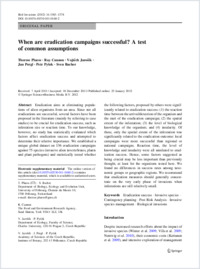When are eradication campaigns successful? A test of common assumptions
- Pluess, Therese Department of Biology, Ecology and Evolution Unit, University of Fribourg, Switzerland
- Cannon, Ray The Food and Environment Research Agency, Sand Hutton, York, UK
- Jarošík, Vojtěch Department of Ecology, Faculty of Science, Charles University, Prague, Czech Republic - Academy of Sciences of the Czech Republic, Institute of Botany, Průhonice, Czech Republic
- Pergl, Jan Academy of Sciences of the Czech Republic, Institute of Botany, Průhonice, Czech Republic
- Pyšek, Petr Academy of Sciences of the Czech Republic, Institute of Botany, Průhonice, Czech Republic - Department of Ecology, Faculty of Science, Charles University, Prague, Czech Republic
- Bacher, Sven Department of Biology, Ecology and Evolution Unit, University of Fribourg, Switzerland
-
25.01.2012
Published in:
- Biological Invasions. - 2012, vol. 14, no. 7, p. 1365-1378
Eradication success
Invasive species
Contingency planning
Pest Risk Analysis
Invasive species management
Biological invasions
English
Eradication aims at eliminating populations of alien organisms from an area. Since not all eradications are successful, several factors have been proposed in the literature (mainly by referring to case studies) to be crucial for eradication success, such as infestation size or reaction time. To our knowledge, however, no study has statistically evaluated which factors affect eradication success and attempted to determine their relative importance. We established a unique global dataset on 136 eradication campaigns against 75 species (invasive alien invertebrates, plants and plant pathogens) and statistically tested whether the following factors, proposed by others were significantly related to eradication success: (1) the reaction time between the arrival/detection of the organism and the start of the eradication campaign; (2) the spatial extent of the infestation; (3) the level of biological knowledge of the organism; and (4) insularity. Of these, only the spatial extent of the infestation was significantly related to the eradication outcome: local campaigns were more successful than regional or national campaigns. Reaction time, the level of knowledge and insularity were all unrelated to eradication success. Hence, some factors suggested as being crucial may be less important than previously thought, at least for the organisms tested here. We found no differences in success rates among taxonomic groups or geographic regions. We recommend that eradication measures should generally concentrate on the very early phase of invasions when infestations are still relatively small.
- Faculty
- Faculté des sciences et de médecine
- Department
- Département de Biologie
- Language
-
- English
- Classification
- Biological sciences
- License
- License undefined
- Identifiers
-
- RERO DOC 29056
- DOI 10.1007/s10530-011-0160-2
- Persistent URL
- https://folia.unifr.ch/unifr/documents/302246
Other files
Statistics
Document views: 90
File downloads:
- 10530_2011_Article_160.pdf: 212
- bac_wec_sm.txt: 46

